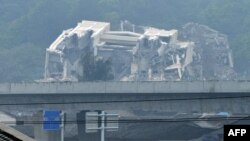BEIJING —
Last month, Chinese authorities tore down one of the largest churches in Wenzhou, a coastal city in the southeast where parishioners had been in a standoff with authorities over the planned demolition. The government says the church violated building codes. But activists say the case is part of a wider crackdown on Christianity.
The number of practicing Christians in China is unclear, but a 2010 Pew survey estimated it at about five percent of the population, or 67 million people. Many observers say that number continues to rise, and can be seen in the numerous large churches that have taken root in cities across the country.
Wenzhou is known as “China's Jerusalem" for its high concentration of Chinese Christians. The Sanjiang church took more than $4 million and 12 years to build, but after it was completed, authorities notified the congregation in March that it was in violation of building codes.
American pastor Dennis Balcombe says the Chinese government has increasingly accepted Christianity over the last few years and this church demolition was an unusual step.
“I was just up in, just last week and spoke with a church that had several thousand people in it and had no problem whatsoever, so it would seem to me that this is an isolated incident," Balcombe said.
However other pastors and religious groups see the demolitions as part of a broader campaign against organized religions.
Last week, the government issued a national security alert on terrorism that raised concerns over spreading religious belief in the country. The alert stated that the “infiltration of religion has constituted a threat to Chinese identification with socialist belief.” The report listed religious infiltration as a severe challenge to China’s social stability. “Western hostile forces are infiltrating China’s religions in a more diverse way and in a wider range.”
Bob Fu, President of the Christian Aid Association which provides legal counsel to Christians in China, links the church demolitions with official policy aimed at curbing the growth of the church.
“This really shows the government is worried about the uncontrollable growth of Christianity in China," Fu said.
China's government has long sought to control religious communities through state-sanctioned organizations and registered places of worship. The practice has brought it into conflict with religious communities, some of which have resisted state control and set up non-sanctioned religious services and gatherings.
Zhao Xiao is a Chinese economist and former head of the Economic Research Center of the China State Council. Although the Communist Party still has an uneasy relationship with organized religion, Zhao says some officials support using Christianity as a means of improving social stability.
“They think Christianity can play a good role in China's civilization, in China's business progress and in China's harmonious society building," Zhao said.
Such opinions are not in the mainstream in China, but with the rising number of Christians, church congregations are growing in wealth and influence. Some Christian groups project that in the next 15 years, the country could have more Christians than the United States.
The number of practicing Christians in China is unclear, but a 2010 Pew survey estimated it at about five percent of the population, or 67 million people. Many observers say that number continues to rise, and can be seen in the numerous large churches that have taken root in cities across the country.
Wenzhou is known as “China's Jerusalem" for its high concentration of Chinese Christians. The Sanjiang church took more than $4 million and 12 years to build, but after it was completed, authorities notified the congregation in March that it was in violation of building codes.
American pastor Dennis Balcombe says the Chinese government has increasingly accepted Christianity over the last few years and this church demolition was an unusual step.
“I was just up in, just last week and spoke with a church that had several thousand people in it and had no problem whatsoever, so it would seem to me that this is an isolated incident," Balcombe said.
However other pastors and religious groups see the demolitions as part of a broader campaign against organized religions.
Last week, the government issued a national security alert on terrorism that raised concerns over spreading religious belief in the country. The alert stated that the “infiltration of religion has constituted a threat to Chinese identification with socialist belief.” The report listed religious infiltration as a severe challenge to China’s social stability. “Western hostile forces are infiltrating China’s religions in a more diverse way and in a wider range.”
Bob Fu, President of the Christian Aid Association which provides legal counsel to Christians in China, links the church demolitions with official policy aimed at curbing the growth of the church.
“This really shows the government is worried about the uncontrollable growth of Christianity in China," Fu said.
China's government has long sought to control religious communities through state-sanctioned organizations and registered places of worship. The practice has brought it into conflict with religious communities, some of which have resisted state control and set up non-sanctioned religious services and gatherings.
Zhao Xiao is a Chinese economist and former head of the Economic Research Center of the China State Council. Although the Communist Party still has an uneasy relationship with organized religion, Zhao says some officials support using Christianity as a means of improving social stability.
“They think Christianity can play a good role in China's civilization, in China's business progress and in China's harmonious society building," Zhao said.
Such opinions are not in the mainstream in China, but with the rising number of Christians, church congregations are growing in wealth and influence. Some Christian groups project that in the next 15 years, the country could have more Christians than the United States.




